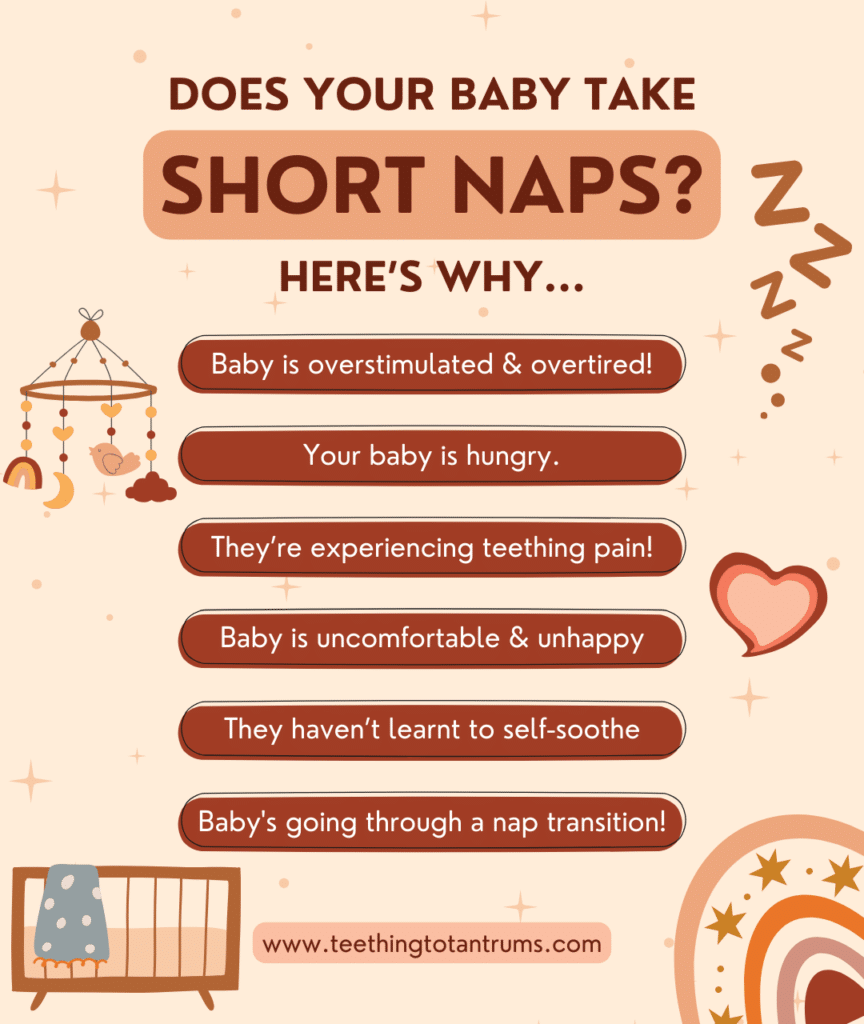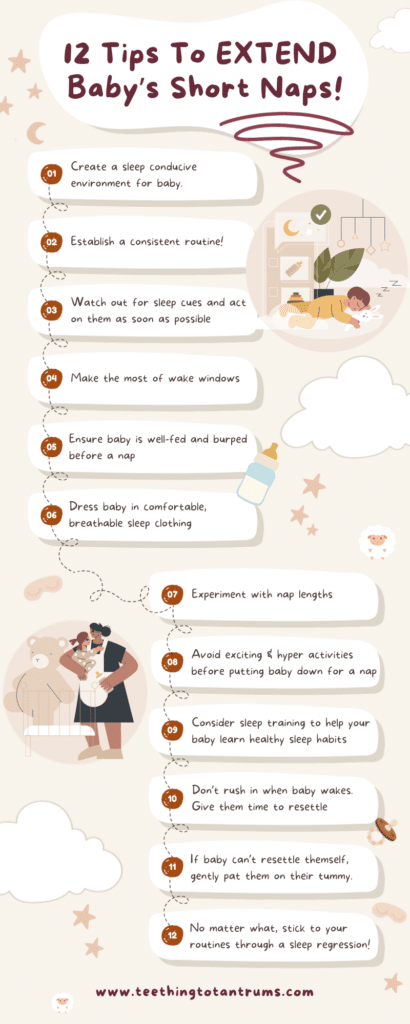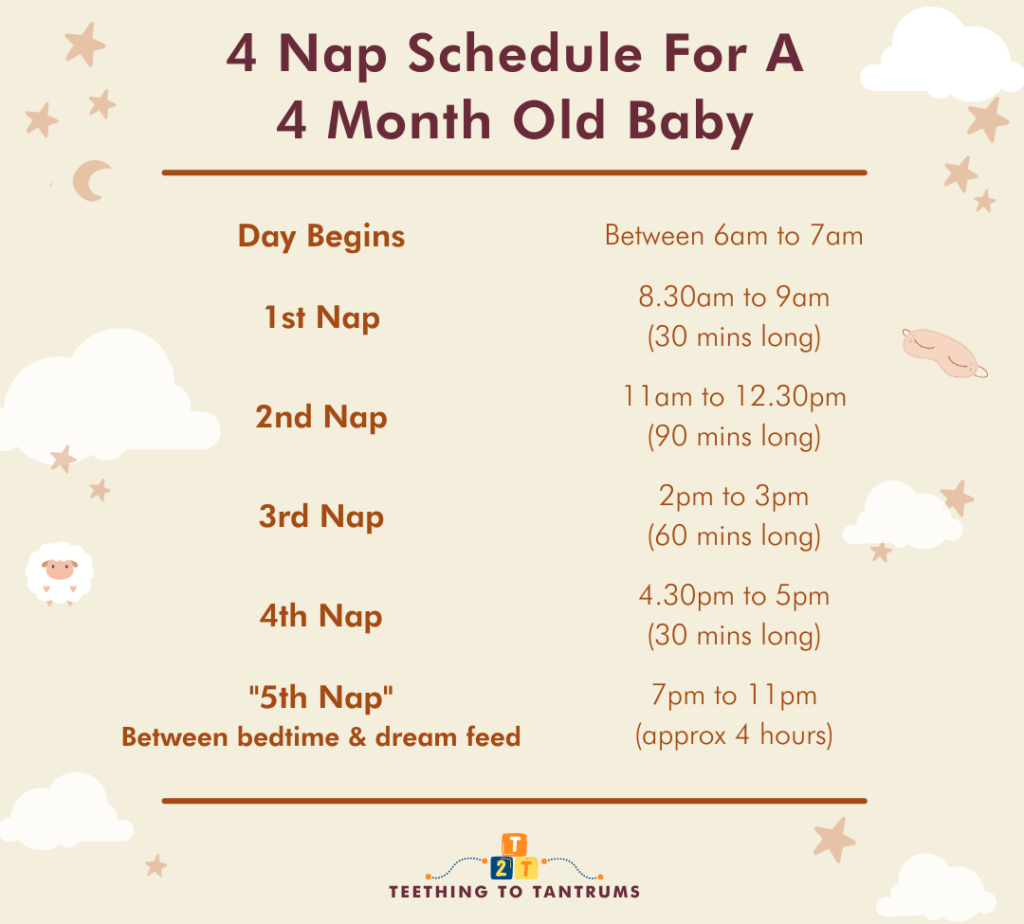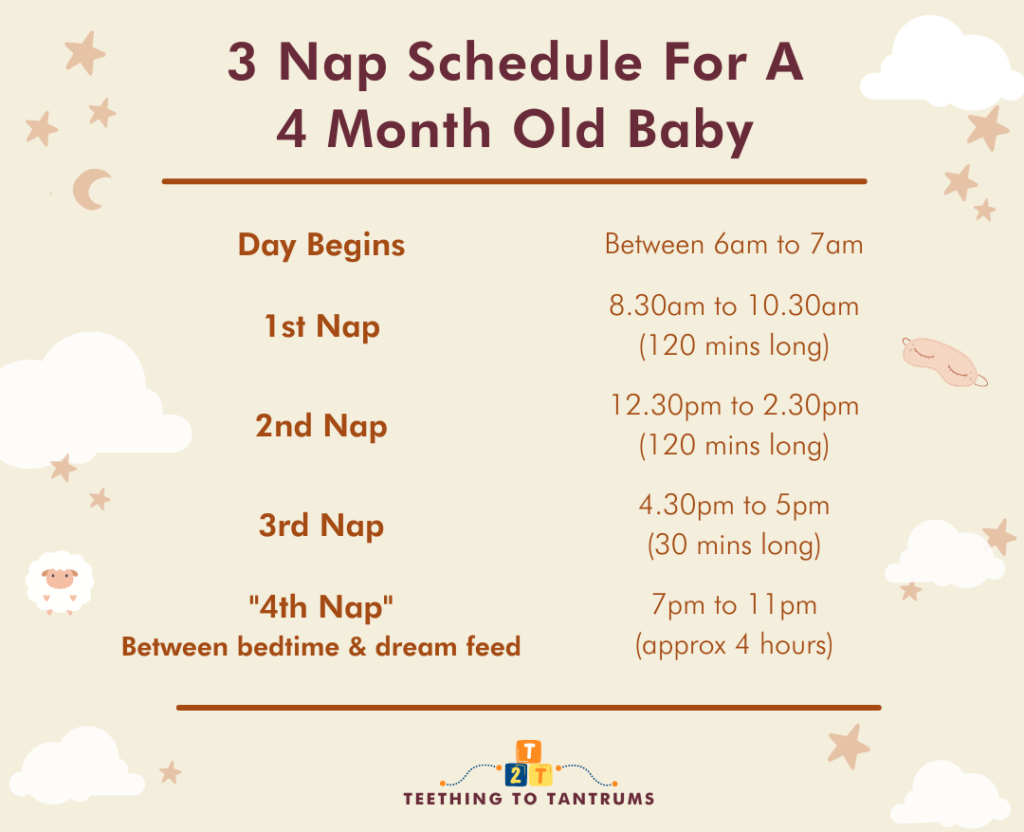Stuck with a baby who won’t sleep? Or do you have a baby who refuses to sleep for more than 20 minutes at a time? Are you wondering how to extend baby’s short naps?
You’re not alone. Short naps are a common issue many parents face. And whilst they’re exhausting and frustrating… The good news is that there are plenty of tricks you can try to help your baby get the daytime sleep they need (so you can have a bit of downtime too!).

Table of Contents
Key Takeaways
- Common reasons for short naps in babies include overstimulation, hunger, discomfort, inability to self-soothe, and nap transitions. Create a calm evening environment and a cozy sleep environment and address any underlying triggers to help extend nap length.
- Watch for tired cues and put baby down at the right time to help your baby sleep for longer. Have age-appropriate wake windows between naps and ensure your baby gets enough daytime sleep overall.
- Be patient with nap transitions and sleep regressions, sleep is a fine balance! And allow your baby to have some self-settling time before intervening when they wake early.
6 Reasons Why Your Baby Takes Short Naps
If your baby is not napping for long periods during the day, there can be many reasons why. Some are obvious and some are not. Here are the top causes of baby’s short naps:

1. Overstimulation and Overtiredness
Young babies can easily become overstimulated by their environment, leading to them fighting sleep at nap times and having difficulty falling asleep and staying asleep.
And believe it or not… being overtired means it’s far harder for your baby to fall asleep.
This is because the hormones adrenaline and cortisol are released to keep baby awake and alert. Sadly, this has the unwanted effect of making it very hard for a tired baby to relax and sleep.
Having a nap time routine that is calm and peaceful followed by putting them down in a darkened room will help.
A white noise machine is also a great way to exclude ambient sounds and will ensure your little one settles more easily and stays asleep for longer.
White noise machines are a game-changer for your little one's sleep and having one that plays all night is a must. With a long-lasting battery, this compact and stylish white noise machine contains 21 non-stop relaxing noises, which will lull your little one to sleep night after night, no matter where you are!
TOP TIP: Avoid letting your baby look at screens or using stimulating toys with lights and noise in the lead-up to nap time.
2. Hunger
Hunger will most definitely wake your baby early from their nap so it is important to make sure they are well fed before you put them down.
Build your little one’s sleep schedule around their feeding schedule to ensure that hunger is not the reason they are waking.
However, be warned…
You do not want to develop a feed-to-sleep habit.
To avoid this unhealthy sleep association, feed baby at least 15 minutes before you put them down to sleep.
3. Teething
Teething can often be disruptive to your baby’s sleep and teething pain will often wake a sleeping baby.
If your little one is showing signs of teething, such as drooling or chewing on objects, they may need some extra comfort.
Try massaging your baby’s gums or giving them a cooled teething ring just before nap time. Also using a white noise machine can help distract them from the pain.
Remember to be patient and give lots of cuddles and comfort. You may have to accept that nap times will be disrupted until the offending tooth has emerged.
4. Discomfort
For the same reason as teething, general discomfort is another reason your baby may not be able to nap for long periods.
Ensure that your baby’s clothing is not too tight, their diaper is clean, and that their room is at the correct temperature.
Has baby been burped? Are they gassy? Is the house too loud?
Check all of these causes to see if they are affecting baby’s naps.
5. Your Baby Is Unable To Self Soothe
Babies that can not self-soothe are more likely to take short naps. If you are rocking or feeding your baby to sleep and putting them down to nap when they are fast asleep they are very likely to wake from their nap during REM sleep and not be able to resettle on their own.
To help your baby learn how to self-settle, read my article: Teaching Baby To Self-Soothe.
Or watch this video:
6. Nap Transition
If your baby is going through a nap transition, they may start to wake early from one or all of their naps during the day.
Nap transitions can be tricky to handle but if you know what age these transitions occur, you can make a plan to handle nap changes:
Here are my articles to help you navigate nap transitions with ease:
- The 4 to 3 Nap Transition
- The 3 to 2 Nap Transition
- The 2 to 1 Nap Transition
- When Do Toddlers Stop Napping?
How To Extend Baby’s Short Naps
As a parent, you know how important it is for your baby to get enough sleep. However, short naps can be frustrating and leave you feeling exhausted.
If your baby is napping for less than 45 -60 minutes consistently… here are some tips to help extend your baby’s naps:

- Create a sleep-conducive environment: Your baby is more likely to nap for longer if their sleep environment is dark, quiet, and at the correct temperature. Using blackout curtains to block out light and a white noise machine to drown out any outside noise can help prolong naps and help your little one sleep more soundly.
- Establish a consistent routine: I am always going on about how important a sleep routine is for your baby. Giving your little one the correct cues that it is time to go to sleep will help them settle more easily and sleep more soundly. A consistent routine should include a pre-nap routine, such as a diaper change or a lullaby, to signal that it’s time to sleep.
- Watch for sleep cues: Timing is key when managing sleep. If you miss your baby’s sleep cues they are likely to become overtired and an overtired baby struggles to settle or stay asleep. Look for signs that your baby is getting tired, such as rubbing their eyes or yawning, and put them down for a nap as soon as you notice these cues.
- Make the most of wake windows: While you should make sure that your baby is not overstimulated just before nap time ensuring they are busy and well-stimulated during their wake windows will ensure they are more ready for sleep. Tummy time and stimulating play during their wake window can ensure they are ready for sleep when nap time comes around.
- Make sure baby is well fed: Hunger will wake your little one from their nap so make sure they go down for their nap with a full tummy.
- Use the right sleepwear: Dress your baby in comfortable, breathable clothing that is appropriate for the season. Being too warm can lead to your baby feeling uncomfortable and waking earlier from their naps.
- Experiment with nap length: It is important to remember that all babies are different. That is why I always look at the amount of age-appropriate sleep a baby needs in 24 hours. Some babies need longer or shorter naps depending on the time of day, what time they usually wake in the morning, how often they wake at night, and what time they go to bed. Try experimenting with different nap lengths to see what works best for you and your baby.
- Avoid overstimulation: Too much activity or excitement before a nap can make it difficult for your baby to fall asleep. Keep playtime calm and quiet leading up to nap time.
- Consider sleep training: If your baby consistently takes short naps, sleep training may be an option to help them learn to sleep for longer periods. The best way to sleep train your baby for naps is to put them down while sleepy but not fast asleep.
- Don’t rush in: Don’t be tempted to rush in and pick your baby up as soon as they wake from a nap especially if they have not napped as long as you wished. If they are awake in their crib but happy, leave them for a short while as they may go back to sleep and even if they don’t, having some quiet time in their crib is good practice for playing alone and self-settling.
- Attempt to resettle: If your baby wakes early from their nap and is not showing signs of self-settling attempt to resettle them by patting or replacing their pacifier to get them back to sleep.
- Stick to the plan through sleep regressions: If your baby is going through a sleep regression their normal sleep cycle may be disrupted for a while. However, it is important to stick to your normal nap routine during a sleep regression and ensure your little one is getting enough sleep to avoid overtiredness. Take a look at these posts if you think your little one is resisting naps due to a sleep regression:
- Sleep Regression: What, Why, and Signs To Look Out For
- 4-Month Sleep Regression
- 6-Month Sleep Regression
- 8-Month Sleep Regression
- 12-Month Sleep Regression
Are Sleep Aids Useful To Extend Baby’s Short Naps?
In a study published by Melissa M. Burnham, Beth L. Goodlin-Jones, Erika E. Gaylor, and Thomas F. Anders in the National Library of Medicine, it is stated “There were no consistent effects on sleep patterns or on self-soothing behavior related to the sleep aid intervention”.
However, after 40 years of childcare experience and helping hundreds of children fall asleep, I can confidently say that sleep aids CAN help your baby sleep.
It’s simply a case of finding the right sleep aid for your little one.
- Some babies sleep wonderfully with a white noise machine, others prefer music.
- Some babies love night lights, others love black-out blinds for a pitch-black room.
- Some babies love audiobooks, others silence.
My son loved audiobooks, but my niece wanted silence.
As a baby, my daughter-in-law said she slept her best with a nightlight whilst her brother wanted pure darkness.
Helping your baby to nap is all about trial and error and finding what works best for them.
How Long Should My Baby Nap For?
As a parent, you may be wondering how long your baby should nap for. The answer to this question varies depending on the age of your baby.
Here is a table that outlines the recommended nap duration and total daytime sleep for babies of different ages:
| Age (Months) | Nap Duration | Total Daytime Sleep | Number of Naps Per Day |
| 0-2 | 30- min -2 hours | 14-17 hours | 4 to 5 |
| 3-4 | 1- 1.5 hours | 12-15 hours | 3 to 5 |
| 5-6 | 1.5-2.5 hours | 14-15 hours | 3 to 4 |
| 7-12 | 1.5 -2.5 hours | 11-14 hours | 2 to 3 |
It’s important to note however that these are general guidelines and every baby is different.
Some babies naturally need more or less sleep than others.
If your baby is consistently napping for less than the recommended duration, it may be a sign that they are not getting enough sleep overall.
In this case, you may consider adjusting their sleep schedule or seeking advice from a pediatrician or sleep consultant.
Looking to get your little one to sleep quickly and effortlessly? Check out my Bedtime and Nap Cheat Sheet and master the art of making daytime naps and bedtimes as seamless as possible.
A bedtime & nap cheat sheet so good your little one will ask you to put them to bed...
Laura Williams "This is a life saver! I'm so glad I downloaded your bedtime & nap cheat sheet. My little one actually asked me to put him to bed last night! Unbelievable! Thank you so much!"
Click Here For The FREE Cheat Sheet
Understanding Baby’s Sleep Schedule
If, despite your best efforts, your baby is constantly overtired and struggling to fall asleep at nap time… it is a sure sign that you need to adjust their sleep schedule.
Establishing a consistent sleep schedule for your baby is one of the most important things you can do to help them sleep better and extend their short naps.
I always emphasize that you cannot look at daytime sleep in isolation and that if your baby is struggling with naps you will need to look at their sleep schedule as a whole…
This means looking at the total amount of sleep they are getting in 24 hours.
- Newborns (0-3 months): 14-17 hours of sleep per day
- Infants (4-11 months): 12-15 hours of sleep per day
- Toddlers (1-2 years): 11-14 hours of sleep per day
To ensure your baby has an age-appropriate sleep schedule, read the following posts:
- Newborn Sleep Schedule
- 1 Month Sleep Schedule
- 2 Month Sleep Schedule
- 3 Month Old Sleep Schedule
- 4 Month Old Sleep Schedule
- 5 Month Old Sleep Schedule
- 6 Month Old Sleep Schedule
- 7 Month Old Sleep Schedule
- 8 Month Old Sleep Schedule
- 9 Month Old Sleep Schedule
- 10 Month Old Sleep Schedule
- 11 Month Old Sleep Schedule
- 12 Month Old Sleep Schedule
REMEMBER: You know your baby best. If your baby is happy, settling to sleep well, and not getting overtired then the amount of sleep they are getting is correct for them, regardless of what any guideline says.
Establishing Baby’s Nap Schedule
Once you’ve established regular wake-ups and bedtime, it’s time to reinforce a consistent nap schedule for your baby.
- Aim for at least three naps per day for babies under 6 months.
- And two naps per day for babies over 6 months.
Schedule naps at the same time each day, and make sure they’re not too close to bedtime to avoid disrupting nighttime sleep.
Here’s what the average nap schedule for a 4-month-old baby can look like when going through a nap transition:

Or with 3 naps…

Remember to check out my sleep schedule posts to find an age-appropriate nap schedule for your baby.
Frequently Asked Questions About Extending Baby’s Naps
Looking for more information about how to extend baby’s naps? Here are the most frequently asked questions answered just for you!
Q: What is the crib 45 method?
A: Babies have a 45-minute sleep cycle and often wake after 45 minutes of sleep. The Crib 45 method is a technique where if your baby wakes after 45 minutes of sleep, you wait 15 minutes before going in to take them out of their crib. This gives your little one the chance to learn how to fall back asleep on their own and forms the fundamentals of self-settling.
Q: Is a 3-hour nap too long for a baby?
A: Generally, a 3-hour nap is too long for a newborn because your baby will need feeding within that time. However, a 3-hour nap would be appropriate for an older baby if they only have 1 nap a day. If your baby does take a 3-hour nap, ensure it does not end too close to bedtime as it can result in your little one not being tired at bedtime.
Q: Should I be worried about baby’s short naps?
A: In most cases, no, you do not need to be worried about baby’s short naps. However, in a study published in the American Journal of Psychiatry, researchers report that in a sample of more than 400 6- to 12-month-old infants, those who were later diagnosed with autism were more likely to have had difficulty falling asleep. If you’re concerned about whether your baby’s inconsistent and short naps are linked to autism, contact your pediatrician.
Q: How can I extend my 2-month-old baby’s short naps?
A: To help extend a 2-month-old baby’s naps, create a consistent nap routine and sleep environment. Use white noise, swaddling, and a dark room to help your baby fall asleep and stay asleep. Also, try to resettle your baby if they wake up too soon by gently patting baby’s tummy.
Q: What are some ways to resettle a baby after a short nap?
A: My favorite way to resettle a baby after a shower nap is to gently shush or pat their tummy. You can pick up and rock your baby, but you must ensure baby does not fall asleep in your arms as this can create an unhealthy sleep association. If your baby is used to a pacifier, offer it to them. Remember to wait a few minutes before going in so your baby can fall back asleep on their own first.
Q: What are some reasons why my baby only takes 20 to 30-minute naps?
A: There are many reasons why your baby only takes 20-minute naps. Including hunger, discomfort, overstimulation, or an inconsistent nap routine. Try to address any underlying issues using the tips I suggested above and create a consistent nap routine to help your baby nap longer.
Need More Parenting Help?
- Download our FREE Bedtime & Nap Sleep Cheat Sheet. It’s a free, easy-to-use and proven formula designed for parents of 0-5 year olds to master the art of consistently undisturbed and restful sleep without the yelling, nagging or exhausting long-winded evenings.
- Check out our Parenting Toolbox. You’ll get access to expertly-chosen products that you can guarantee are the best for your little one and your wallet.
- Are you looking for personalized guidance to navigate the challenges of parenting? I offer 1-on-1 consultations to bring you tailored strategies and actionable advice to help support your child's growth and well-being with confidence.

A bedtime & nap cheat sheet so good your little one will ask you to put them to bed...
Laura Williams "This is a life saver! I'm so glad I downloaded your bedtime & nap cheat sheet. My little one actually asked me to put him to bed last night! Unbelievable! Thank you so much!"
Click Here For The FREE Cheat Sheet



